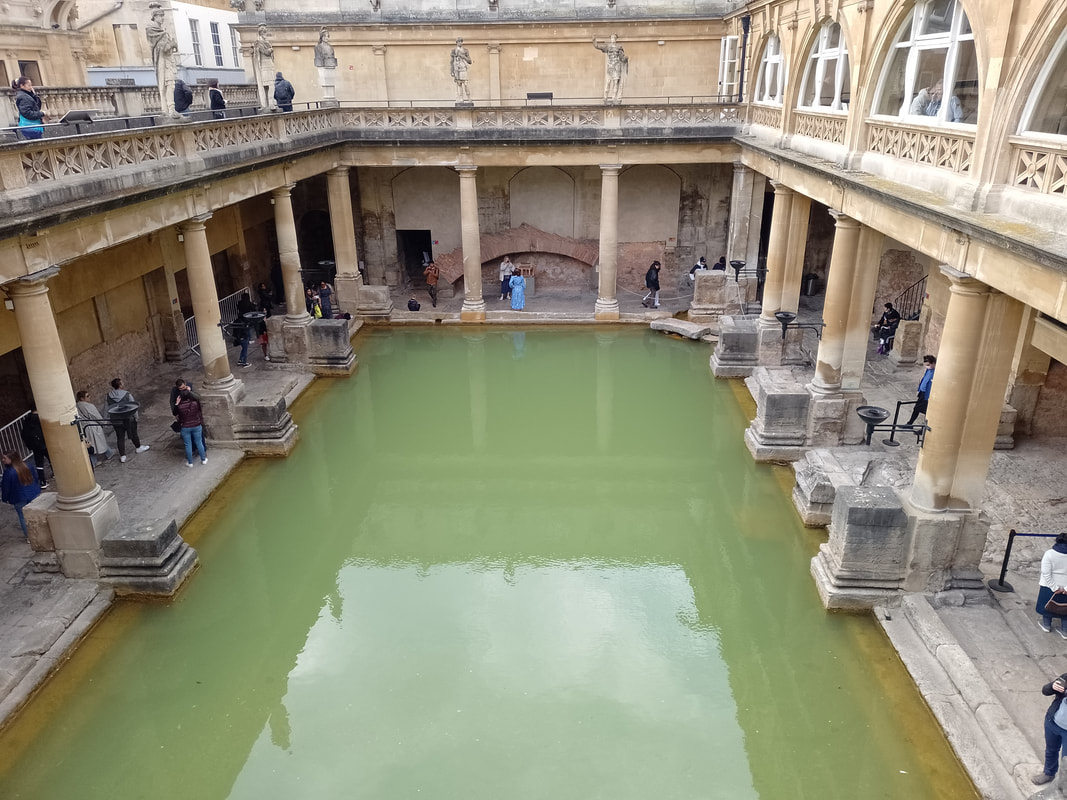|
2/5/2022 0 Comments The Goddess SulisRecently I decided to take myself off for a weekend away here in the UK - a bit of a 'staycation' to get out and do something a bit different. So I decided to go to the City of Bath - a beautiful city full of brilliant architecture and historical attractions, as well as the home of the Goddess Sulis. Sulis is not a Goddess I have worked with before, but as a water deity she has been on my radar for a while. So I thought what better chance would I have to both enjoy a relaxing staycation, and learn about her? So who is Sulis? Unfortunately, not much is known about the Goddess Sulis. Most scholarly accounts agree that she was a Celtic Goddess, although reference to her has only been found at the English city of Bath. Now, peoples from the Celtic period didn't write much down, and so most of what we know of her comes from Roman sources. However, it is believed that the Celts worshipped Sulis before the arrival of the Romans. As a part of their rule, the Romans took certain Celtic deities and 'Romanized' them, and so with Roman rule Sulis became Sulis-Minerva. The city of Bath was called 'Aqua Sulis', literally 'water Sulis' and became an important town in Romano-British culture. It is believed that the main function of the city was to act as a religious centre, a dedication to Sulis and her healing waters. The waters that flow beneath Bath were reputed to have healing powers, and people would come from miles around to visit the springs to help heal various ailments. There are three natural springs in the heart of the city, and the water rises to the surface at a constant temperature of at least 45C, which is quite unique in the UK. As well as bathing in it, the water was also drank and came to be recognised as helping various ailments. This is by far Sulis' most prominent association - that of a Goddess of healing, specifically through the springs that still run through Bath. You can visit Sulis' temple in Bath and see the courtyard, the altars, the various coins and offerings given to Sulis to petition her for healing (and other asks which I will go onto in a minute). Whilst you aren't allowed to touch the water from the temple, you can buy a bottle of it from the gift shop. Alternatively, head to the Thermae Spa which uses the water from one of the springs in its pools. It isn't a cheap experience, but well worth it if you want to experience Sulis' healing waters for yourself. Sulis was also believed to be a solar deity based mostly on her name. However, there is some argument as to whether her name comes from the Proto-Celtic root 'Suil', related to various Indo-European words for 'Sun', or whether it comes from either the old Irish word for eye or sight. The heat of the springs and that being an important factor in their healing can also help us see how Sulis might be connected with the sun through that association, and the sun is often associated with healing energies in general. Honestly, whilst I was at the temple I could absolutely feel a solar connection with Sulis but again, there is not much historical evidence to back this up as far as I'm aware (and if anyone does know of any then please do let me know, always keen to find out more!).
She was also seen as a Goddess of justice. One of the interesting things about the bath temple was the number of curse tablets they found there. Roughly 130 of these curse tablets - also known by the latin defixiones - were found dating to the Roman period. These were small metal sheets inscribed with curses and then thrown into the spring. These weren't exactly curses in the sense that we may think of today, but rather calls for retribution. The majority of them were to do with petty thefts, asking Sulis to curse the thief if they were not returned. Some of them were quite graphic in their detail when describing exactly what they wanted Sulis to do to the thief should they fail to return the stolen item! Sulis could be seen as the shining light of justice, one who would grant retribution to those who had been wronged. This seems in polar opposite to her role as a healing Goddess, and shows the dual nature of this Goddess. And whilst it may seem difficult to reconcile the two, in my experience with Sulis, it just...works. Despite some of the graphic nature of the requests made to her, hers is not vengeance but justice which she delivers in a measured and balanced way. You can see some of these tablets displayed at her temple at the Roman Baths. Whilst she later became 'Sulis-Minerva', it is difficult to know whether she took on any of Minerva's additional qualities thanks to the lack of information on her, such as Minerva's assocation with arts and crafts of strategic warfare. However, it is clear that Sulis was considered a powerful healing force by the Celts and the Roman's, and her power is still evident today when you walk herr temple or bathe in her sacred springs.
0 Comments
Leave a Reply. |
The Weekly Witch:Once I week I talk about something 'witchcraft' related I have done with my week. How we incorporate witchcraft into our every day lives is always a topic that has interested me, so I wanted to start this blog to explore it further! Archives
August 2023
Categories |

 RSS Feed
RSS Feed
